Business Law Assignment: Contract Law Analysis and Case Solutions
VerifiedAdded on 2021/04/17
|9
|1380
|141
Homework Assignment
AI Summary
This business law assignment provides a detailed analysis of various contract law issues through the examination of six different problems. The assignment explores key concepts such as the formation of legally binding agreements, breach of contract, and the importance of intention to create legal relations, as demonstrated in the case of Charlie and Ali. It also examines the concept of consideration, including whether public duties can constitute sufficient consideration, as seen in the case of Nick. The assignment further delves into the rules surrounding part payment of debt and its implications, as illustrated in the case of Mike and Helen, along with the incorporation of terms in contracts, particularly regarding unusual or onerous terms, as shown in the case of Lizzie. Additionally, it addresses the impact of signed documents and exemption clauses, as exemplified by the case of Tori, and the concept of goods being 'fit for purpose,' using the case of Sandra as a reference. Each problem is analyzed based on relevant case laws, providing a comprehensive understanding of the legal principles involved and their practical application.
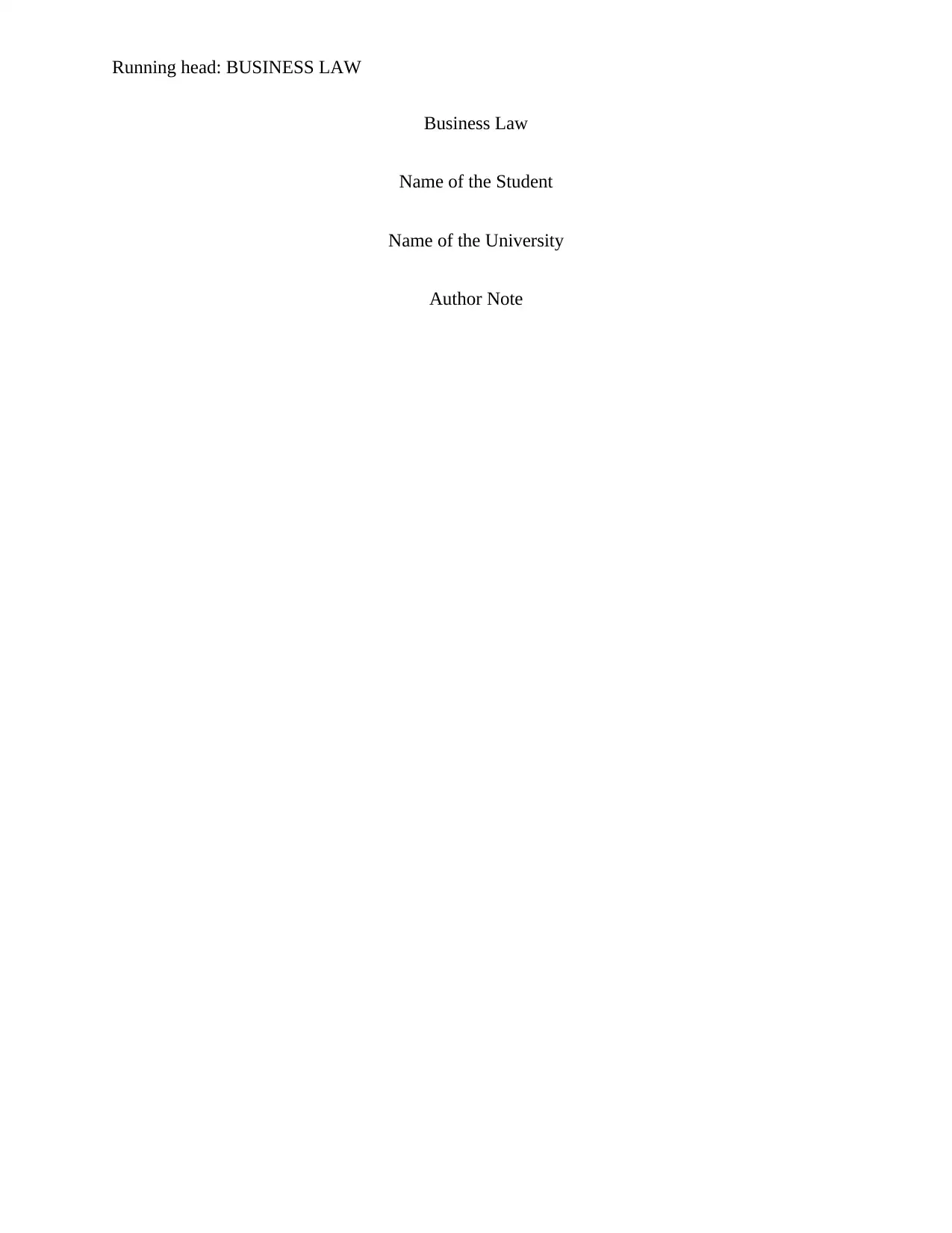
Running head: BUSINESS LAW
Business Law
Name of the Student
Name of the University
Author Note
Business Law
Name of the Student
Name of the University
Author Note
Paraphrase This Document
Need a fresh take? Get an instant paraphrase of this document with our AI Paraphraser
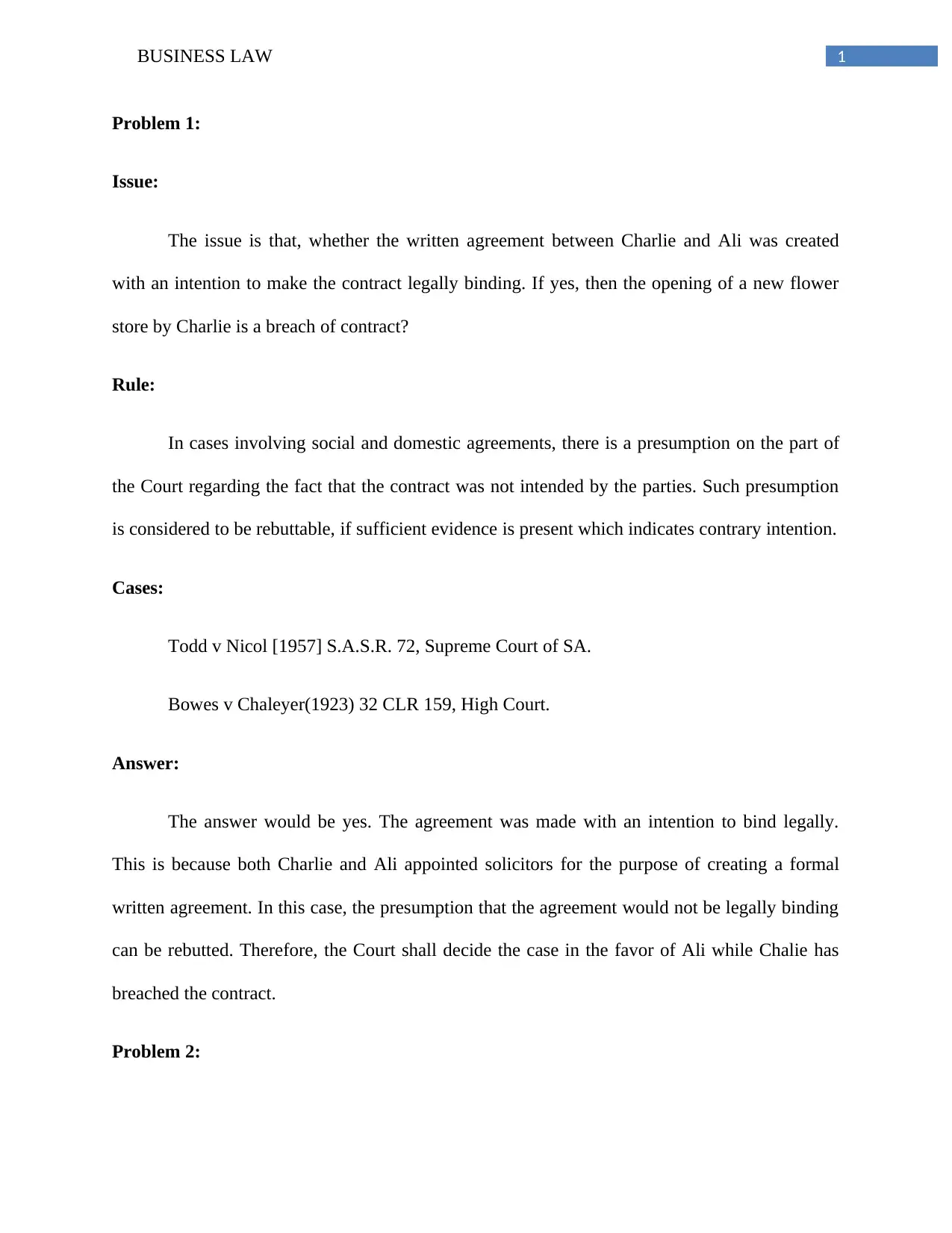
1BUSINESS LAW
Problem 1:
Issue:
The issue is that, whether the written agreement between Charlie and Ali was created
with an intention to make the contract legally binding. If yes, then the opening of a new flower
store by Charlie is a breach of contract?
Rule:
In cases involving social and domestic agreements, there is a presumption on the part of
the Court regarding the fact that the contract was not intended by the parties. Such presumption
is considered to be rebuttable, if sufficient evidence is present which indicates contrary intention.
Cases:
Todd v Nicol [1957] S.A.S.R. 72, Supreme Court of SA.
Bowes v Chaleyer(1923) 32 CLR 159, High Court.
Answer:
The answer would be yes. The agreement was made with an intention to bind legally.
This is because both Charlie and Ali appointed solicitors for the purpose of creating a formal
written agreement. In this case, the presumption that the agreement would not be legally binding
can be rebutted. Therefore, the Court shall decide the case in the favor of Ali while Chalie has
breached the contract.
Problem 2:
Problem 1:
Issue:
The issue is that, whether the written agreement between Charlie and Ali was created
with an intention to make the contract legally binding. If yes, then the opening of a new flower
store by Charlie is a breach of contract?
Rule:
In cases involving social and domestic agreements, there is a presumption on the part of
the Court regarding the fact that the contract was not intended by the parties. Such presumption
is considered to be rebuttable, if sufficient evidence is present which indicates contrary intention.
Cases:
Todd v Nicol [1957] S.A.S.R. 72, Supreme Court of SA.
Bowes v Chaleyer(1923) 32 CLR 159, High Court.
Answer:
The answer would be yes. The agreement was made with an intention to bind legally.
This is because both Charlie and Ali appointed solicitors for the purpose of creating a formal
written agreement. In this case, the presumption that the agreement would not be legally binding
can be rebutted. Therefore, the Court shall decide the case in the favor of Ali while Chalie has
breached the contract.
Problem 2:
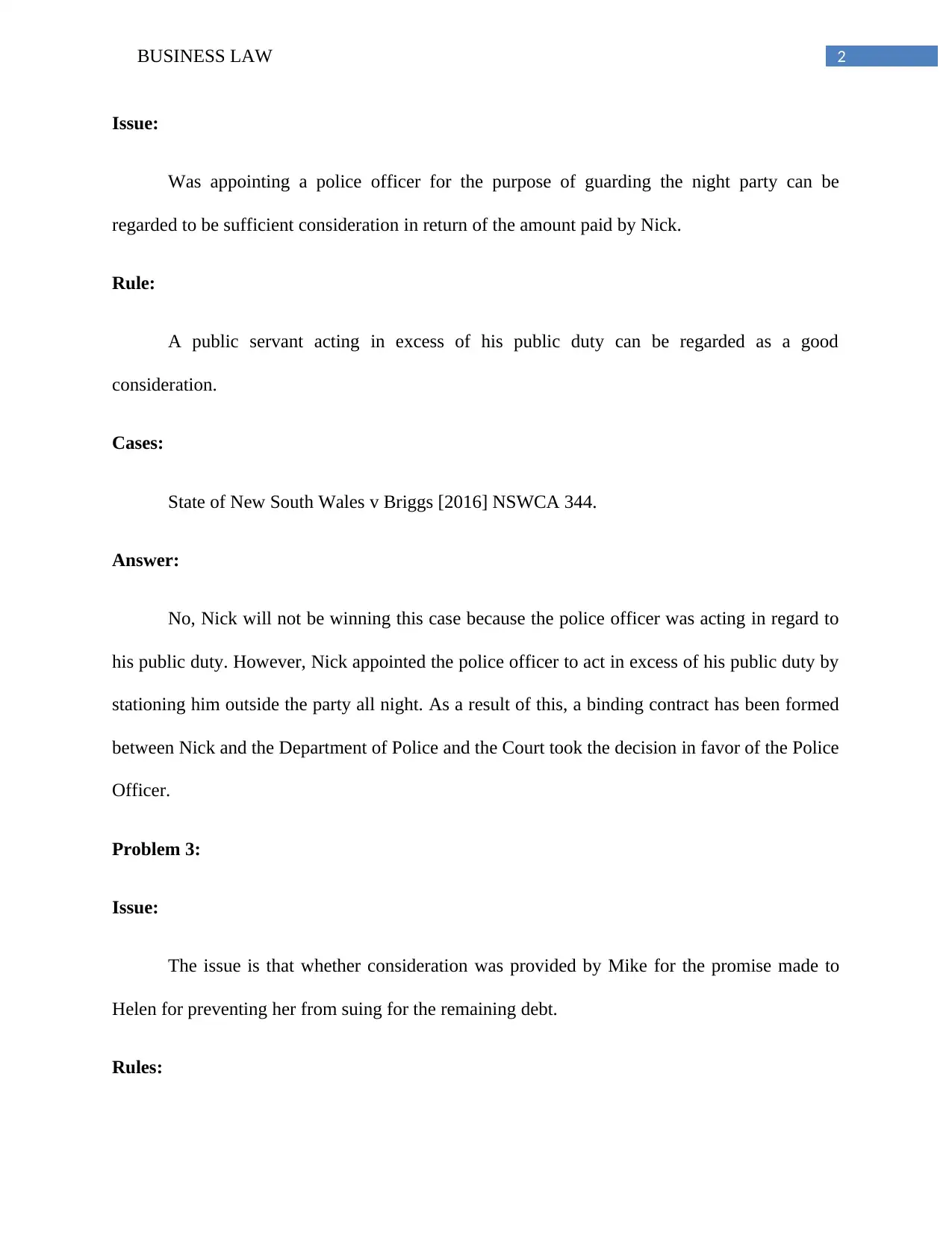
2BUSINESS LAW
Issue:
Was appointing a police officer for the purpose of guarding the night party can be
regarded to be sufficient consideration in return of the amount paid by Nick.
Rule:
A public servant acting in excess of his public duty can be regarded as a good
consideration.
Cases:
State of New South Wales v Briggs [2016] NSWCA 344.
Answer:
No, Nick will not be winning this case because the police officer was acting in regard to
his public duty. However, Nick appointed the police officer to act in excess of his public duty by
stationing him outside the party all night. As a result of this, a binding contract has been formed
between Nick and the Department of Police and the Court took the decision in favor of the Police
Officer.
Problem 3:
Issue:
The issue is that whether consideration was provided by Mike for the promise made to
Helen for preventing her from suing for the remaining debt.
Rules:
Issue:
Was appointing a police officer for the purpose of guarding the night party can be
regarded to be sufficient consideration in return of the amount paid by Nick.
Rule:
A public servant acting in excess of his public duty can be regarded as a good
consideration.
Cases:
State of New South Wales v Briggs [2016] NSWCA 344.
Answer:
No, Nick will not be winning this case because the police officer was acting in regard to
his public duty. However, Nick appointed the police officer to act in excess of his public duty by
stationing him outside the party all night. As a result of this, a binding contract has been formed
between Nick and the Department of Police and the Court took the decision in favor of the Police
Officer.
Problem 3:
Issue:
The issue is that whether consideration was provided by Mike for the promise made to
Helen for preventing her from suing for the remaining debt.
Rules:
⊘ This is a preview!⊘
Do you want full access?
Subscribe today to unlock all pages.

Trusted by 1+ million students worldwide
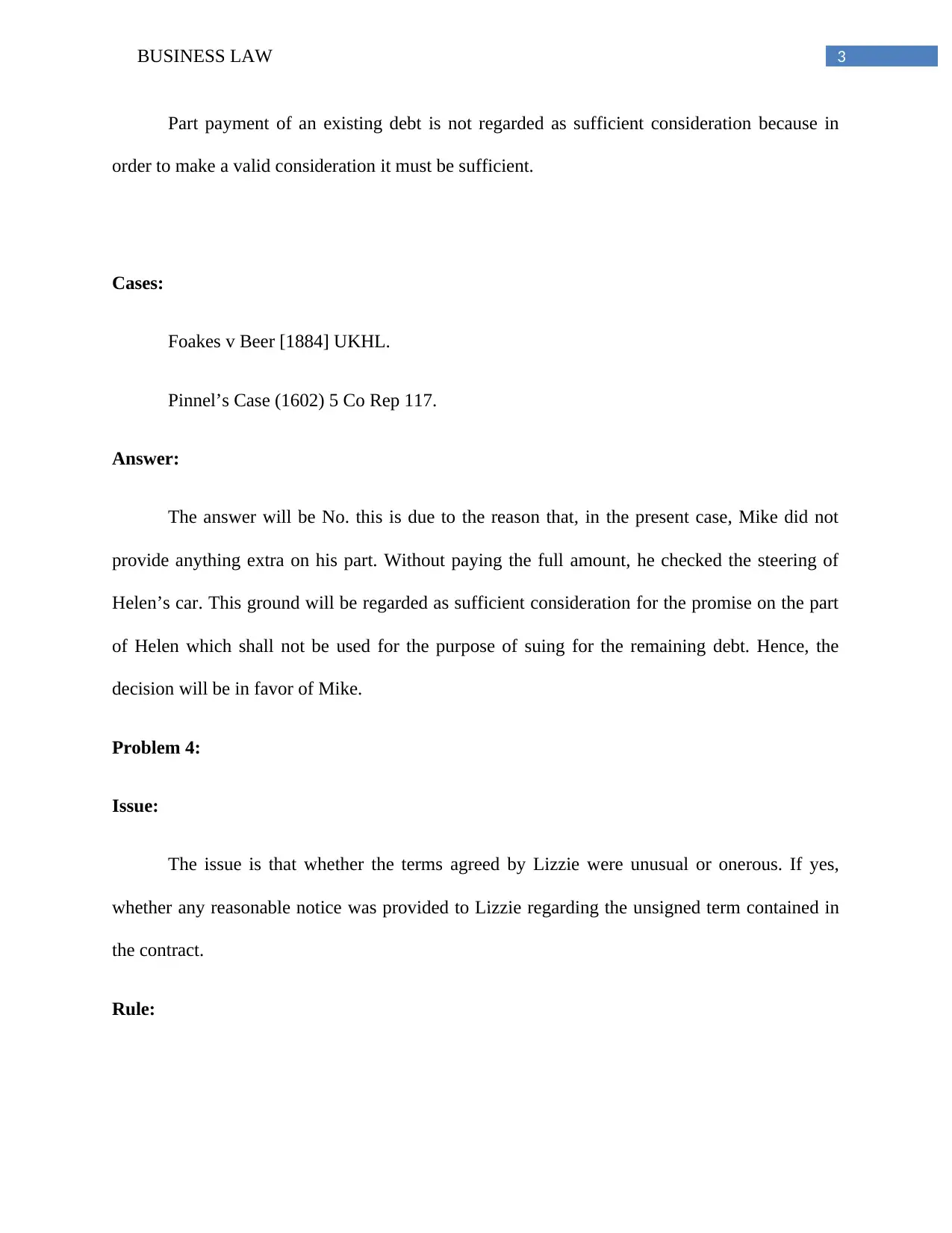
3BUSINESS LAW
Part payment of an existing debt is not regarded as sufficient consideration because in
order to make a valid consideration it must be sufficient.
Cases:
Foakes v Beer [1884] UKHL.
Pinnel’s Case (1602) 5 Co Rep 117.
Answer:
The answer will be No. this is due to the reason that, in the present case, Mike did not
provide anything extra on his part. Without paying the full amount, he checked the steering of
Helen’s car. This ground will be regarded as sufficient consideration for the promise on the part
of Helen which shall not be used for the purpose of suing for the remaining debt. Hence, the
decision will be in favor of Mike.
Problem 4:
Issue:
The issue is that whether the terms agreed by Lizzie were unusual or onerous. If yes,
whether any reasonable notice was provided to Lizzie regarding the unsigned term contained in
the contract.
Rule:
Part payment of an existing debt is not regarded as sufficient consideration because in
order to make a valid consideration it must be sufficient.
Cases:
Foakes v Beer [1884] UKHL.
Pinnel’s Case (1602) 5 Co Rep 117.
Answer:
The answer will be No. this is due to the reason that, in the present case, Mike did not
provide anything extra on his part. Without paying the full amount, he checked the steering of
Helen’s car. This ground will be regarded as sufficient consideration for the promise on the part
of Helen which shall not be used for the purpose of suing for the remaining debt. Hence, the
decision will be in favor of Mike.
Problem 4:
Issue:
The issue is that whether the terms agreed by Lizzie were unusual or onerous. If yes,
whether any reasonable notice was provided to Lizzie regarding the unsigned term contained in
the contract.
Rule:
Paraphrase This Document
Need a fresh take? Get an instant paraphrase of this document with our AI Paraphraser
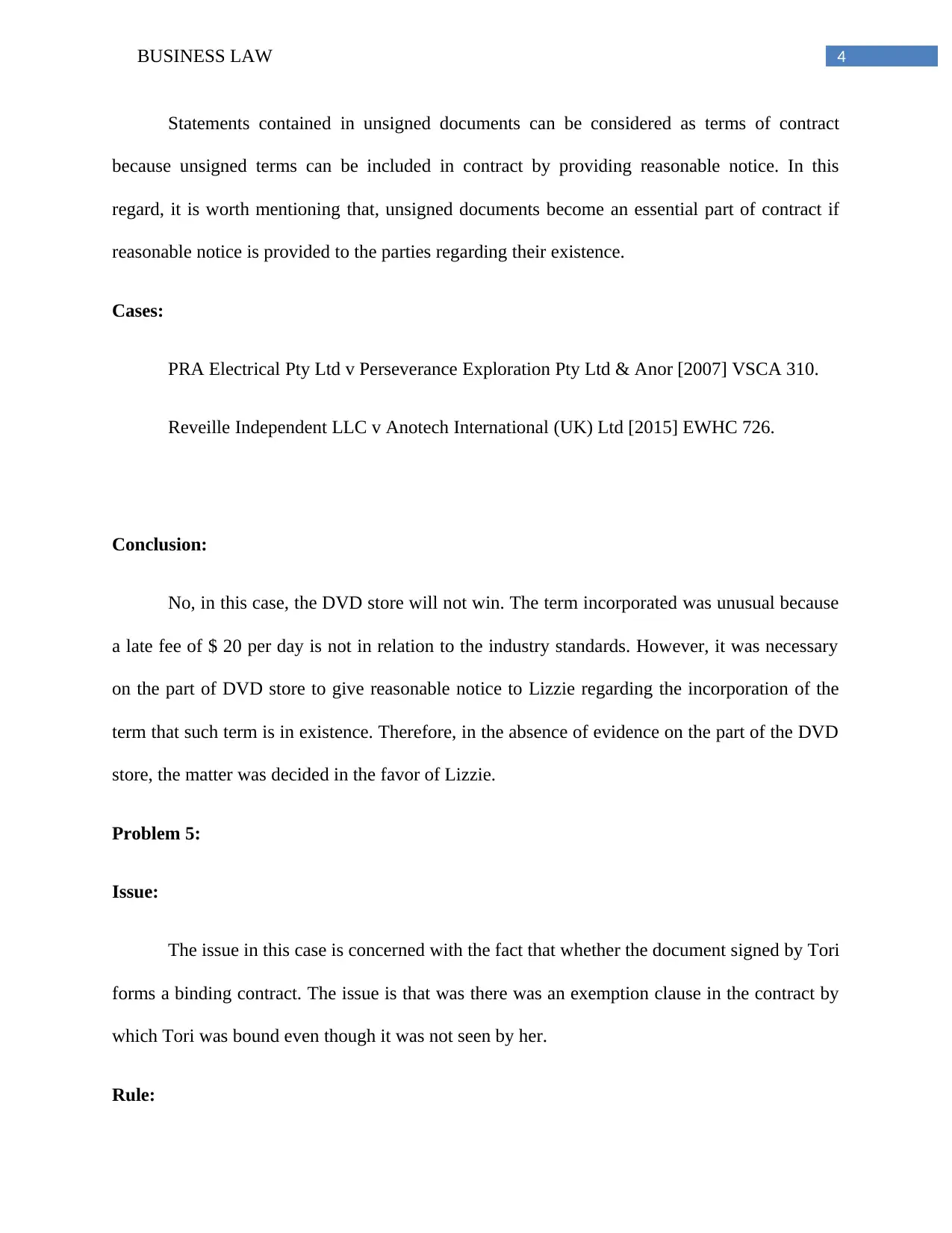
4BUSINESS LAW
Statements contained in unsigned documents can be considered as terms of contract
because unsigned terms can be included in contract by providing reasonable notice. In this
regard, it is worth mentioning that, unsigned documents become an essential part of contract if
reasonable notice is provided to the parties regarding their existence.
Cases:
PRA Electrical Pty Ltd v Perseverance Exploration Pty Ltd & Anor [2007] VSCA 310.
Reveille Independent LLC v Anotech International (UK) Ltd [2015] EWHC 726.
Conclusion:
No, in this case, the DVD store will not win. The term incorporated was unusual because
a late fee of $ 20 per day is not in relation to the industry standards. However, it was necessary
on the part of DVD store to give reasonable notice to Lizzie regarding the incorporation of the
term that such term is in existence. Therefore, in the absence of evidence on the part of the DVD
store, the matter was decided in the favor of Lizzie.
Problem 5:
Issue:
The issue in this case is concerned with the fact that whether the document signed by Tori
forms a binding contract. The issue is that was there was an exemption clause in the contract by
which Tori was bound even though it was not seen by her.
Rule:
Statements contained in unsigned documents can be considered as terms of contract
because unsigned terms can be included in contract by providing reasonable notice. In this
regard, it is worth mentioning that, unsigned documents become an essential part of contract if
reasonable notice is provided to the parties regarding their existence.
Cases:
PRA Electrical Pty Ltd v Perseverance Exploration Pty Ltd & Anor [2007] VSCA 310.
Reveille Independent LLC v Anotech International (UK) Ltd [2015] EWHC 726.
Conclusion:
No, in this case, the DVD store will not win. The term incorporated was unusual because
a late fee of $ 20 per day is not in relation to the industry standards. However, it was necessary
on the part of DVD store to give reasonable notice to Lizzie regarding the incorporation of the
term that such term is in existence. Therefore, in the absence of evidence on the part of the DVD
store, the matter was decided in the favor of Lizzie.
Problem 5:
Issue:
The issue in this case is concerned with the fact that whether the document signed by Tori
forms a binding contract. The issue is that was there was an exemption clause in the contract by
which Tori was bound even though it was not seen by her.
Rule:
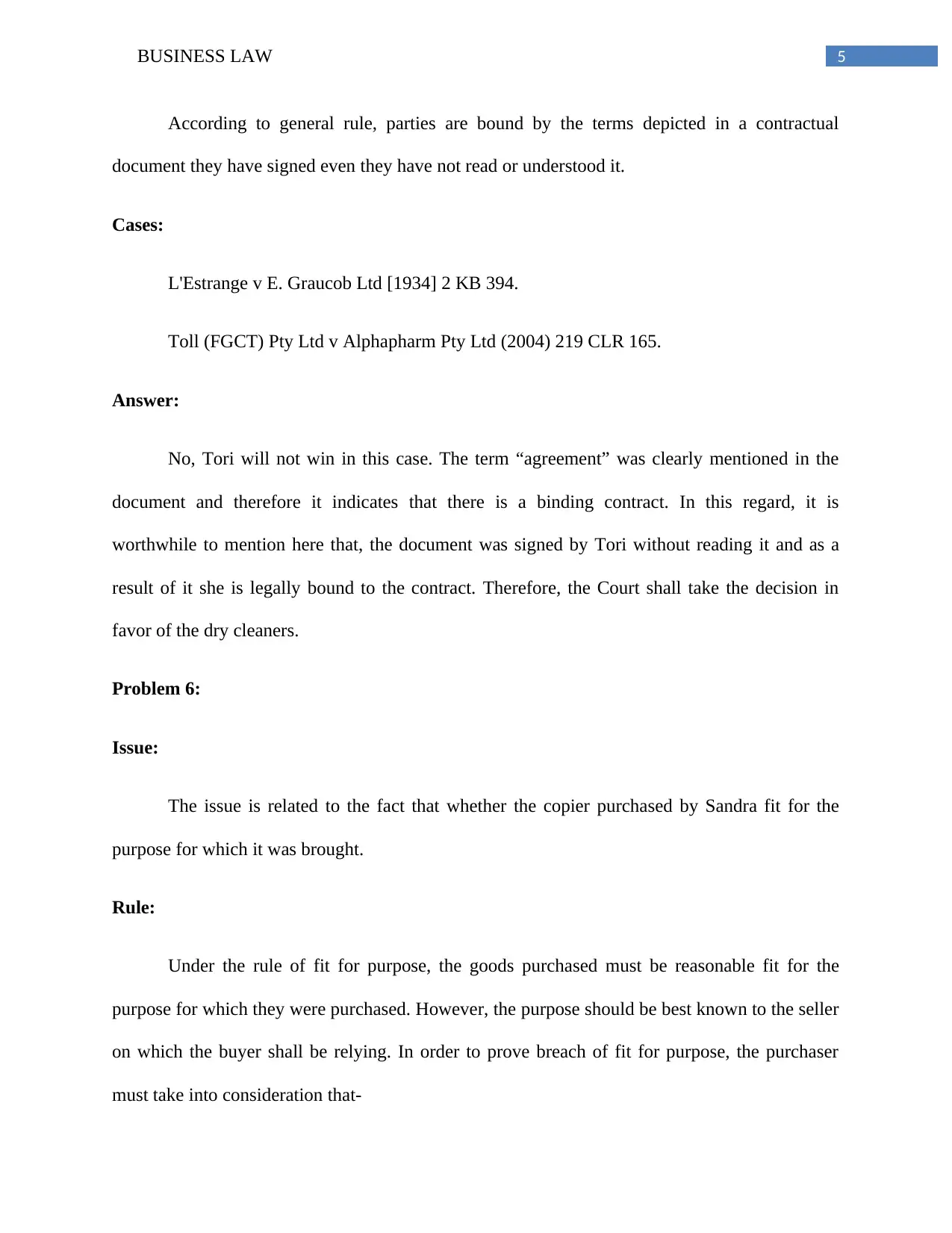
5BUSINESS LAW
According to general rule, parties are bound by the terms depicted in a contractual
document they have signed even they have not read or understood it.
Cases:
L'Estrange v E. Graucob Ltd [1934] 2 KB 394.
Toll (FGCT) Pty Ltd v Alphapharm Pty Ltd (2004) 219 CLR 165.
Answer:
No, Tori will not win in this case. The term “agreement” was clearly mentioned in the
document and therefore it indicates that there is a binding contract. In this regard, it is
worthwhile to mention here that, the document was signed by Tori without reading it and as a
result of it she is legally bound to the contract. Therefore, the Court shall take the decision in
favor of the dry cleaners.
Problem 6:
Issue:
The issue is related to the fact that whether the copier purchased by Sandra fit for the
purpose for which it was brought.
Rule:
Under the rule of fit for purpose, the goods purchased must be reasonable fit for the
purpose for which they were purchased. However, the purpose should be best known to the seller
on which the buyer shall be relying. In order to prove breach of fit for purpose, the purchaser
must take into consideration that-
According to general rule, parties are bound by the terms depicted in a contractual
document they have signed even they have not read or understood it.
Cases:
L'Estrange v E. Graucob Ltd [1934] 2 KB 394.
Toll (FGCT) Pty Ltd v Alphapharm Pty Ltd (2004) 219 CLR 165.
Answer:
No, Tori will not win in this case. The term “agreement” was clearly mentioned in the
document and therefore it indicates that there is a binding contract. In this regard, it is
worthwhile to mention here that, the document was signed by Tori without reading it and as a
result of it she is legally bound to the contract. Therefore, the Court shall take the decision in
favor of the dry cleaners.
Problem 6:
Issue:
The issue is related to the fact that whether the copier purchased by Sandra fit for the
purpose for which it was brought.
Rule:
Under the rule of fit for purpose, the goods purchased must be reasonable fit for the
purpose for which they were purchased. However, the purpose should be best known to the seller
on which the buyer shall be relying. In order to prove breach of fit for purpose, the purchaser
must take into consideration that-
⊘ This is a preview!⊘
Do you want full access?
Subscribe today to unlock all pages.

Trusted by 1+ million students worldwide
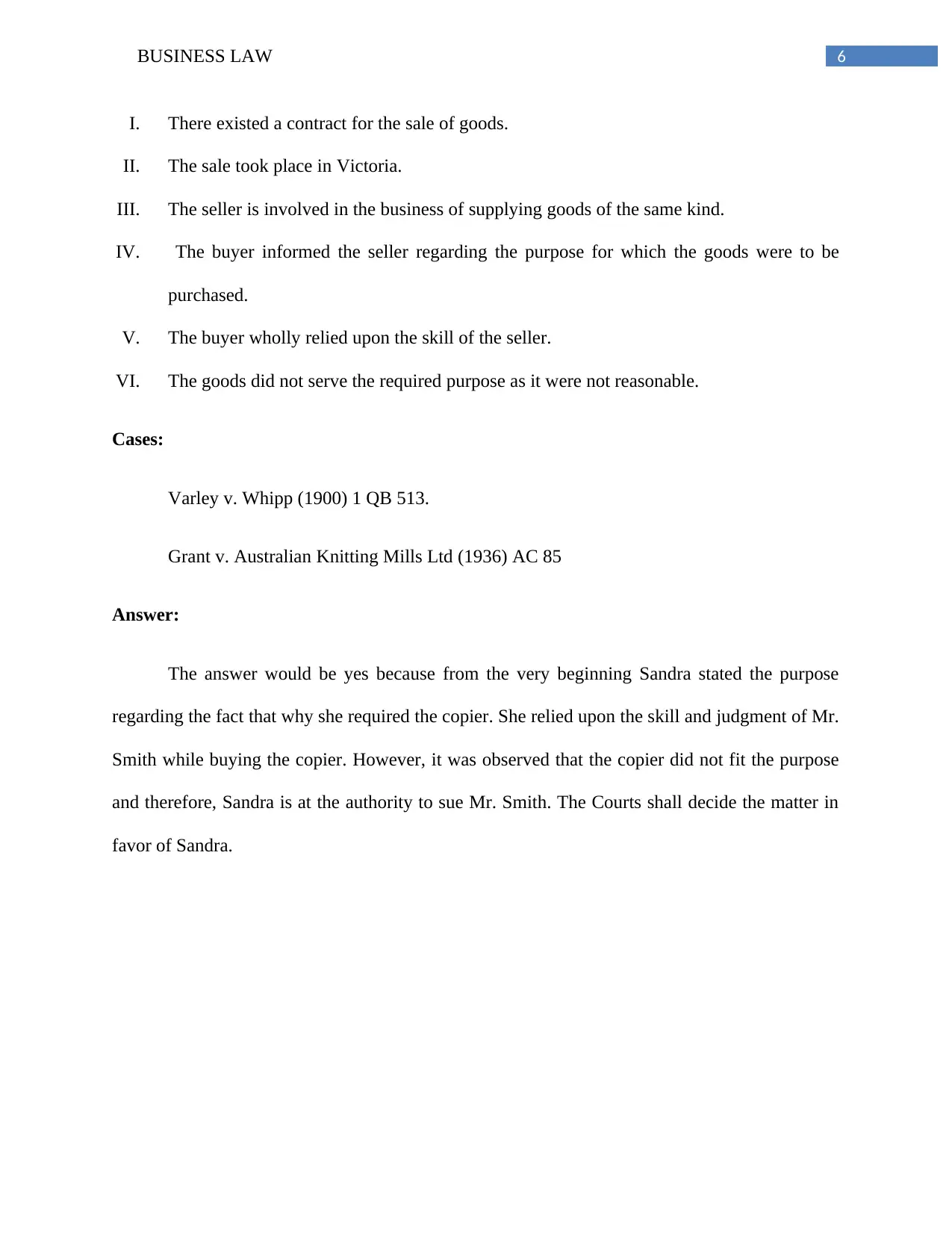
6BUSINESS LAW
I. There existed a contract for the sale of goods.
II. The sale took place in Victoria.
III. The seller is involved in the business of supplying goods of the same kind.
IV. The buyer informed the seller regarding the purpose for which the goods were to be
purchased.
V. The buyer wholly relied upon the skill of the seller.
VI. The goods did not serve the required purpose as it were not reasonable.
Cases:
Varley v. Whipp (1900) 1 QB 513.
Grant v. Australian Knitting Mills Ltd (1936) AC 85
Answer:
The answer would be yes because from the very beginning Sandra stated the purpose
regarding the fact that why she required the copier. She relied upon the skill and judgment of Mr.
Smith while buying the copier. However, it was observed that the copier did not fit the purpose
and therefore, Sandra is at the authority to sue Mr. Smith. The Courts shall decide the matter in
favor of Sandra.
I. There existed a contract for the sale of goods.
II. The sale took place in Victoria.
III. The seller is involved in the business of supplying goods of the same kind.
IV. The buyer informed the seller regarding the purpose for which the goods were to be
purchased.
V. The buyer wholly relied upon the skill of the seller.
VI. The goods did not serve the required purpose as it were not reasonable.
Cases:
Varley v. Whipp (1900) 1 QB 513.
Grant v. Australian Knitting Mills Ltd (1936) AC 85
Answer:
The answer would be yes because from the very beginning Sandra stated the purpose
regarding the fact that why she required the copier. She relied upon the skill and judgment of Mr.
Smith while buying the copier. However, it was observed that the copier did not fit the purpose
and therefore, Sandra is at the authority to sue Mr. Smith. The Courts shall decide the matter in
favor of Sandra.
Paraphrase This Document
Need a fresh take? Get an instant paraphrase of this document with our AI Paraphraser
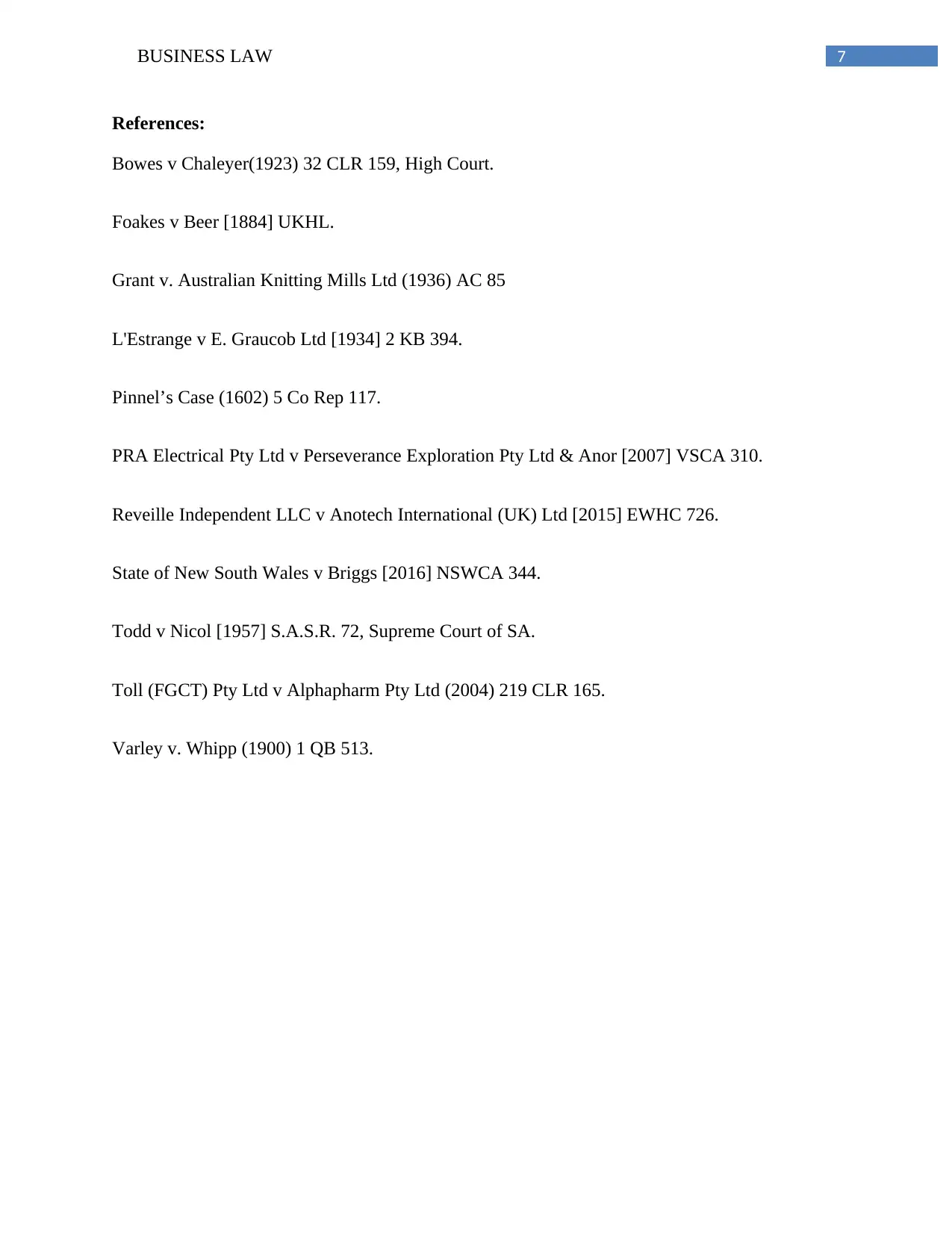
7BUSINESS LAW
References:
Bowes v Chaleyer(1923) 32 CLR 159, High Court.
Foakes v Beer [1884] UKHL.
Grant v. Australian Knitting Mills Ltd (1936) AC 85
L'Estrange v E. Graucob Ltd [1934] 2 KB 394.
Pinnel’s Case (1602) 5 Co Rep 117.
PRA Electrical Pty Ltd v Perseverance Exploration Pty Ltd & Anor [2007] VSCA 310.
Reveille Independent LLC v Anotech International (UK) Ltd [2015] EWHC 726.
State of New South Wales v Briggs [2016] NSWCA 344.
Todd v Nicol [1957] S.A.S.R. 72, Supreme Court of SA.
Toll (FGCT) Pty Ltd v Alphapharm Pty Ltd (2004) 219 CLR 165.
Varley v. Whipp (1900) 1 QB 513.
References:
Bowes v Chaleyer(1923) 32 CLR 159, High Court.
Foakes v Beer [1884] UKHL.
Grant v. Australian Knitting Mills Ltd (1936) AC 85
L'Estrange v E. Graucob Ltd [1934] 2 KB 394.
Pinnel’s Case (1602) 5 Co Rep 117.
PRA Electrical Pty Ltd v Perseverance Exploration Pty Ltd & Anor [2007] VSCA 310.
Reveille Independent LLC v Anotech International (UK) Ltd [2015] EWHC 726.
State of New South Wales v Briggs [2016] NSWCA 344.
Todd v Nicol [1957] S.A.S.R. 72, Supreme Court of SA.
Toll (FGCT) Pty Ltd v Alphapharm Pty Ltd (2004) 219 CLR 165.
Varley v. Whipp (1900) 1 QB 513.

8BUSINESS LAW
⊘ This is a preview!⊘
Do you want full access?
Subscribe today to unlock all pages.

Trusted by 1+ million students worldwide
1 out of 9
Related Documents
Your All-in-One AI-Powered Toolkit for Academic Success.
+13062052269
info@desklib.com
Available 24*7 on WhatsApp / Email
![[object Object]](/_next/static/media/star-bottom.7253800d.svg)
Unlock your academic potential
Copyright © 2020–2026 A2Z Services. All Rights Reserved. Developed and managed by ZUCOL.


